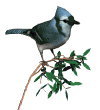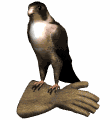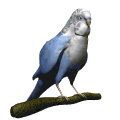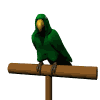























The oldest known bird ( Archaeopteryx ) resembled reptiles in limb bones and other features. Birds with their horny beaks, scaly legs, and egg-laying, still have some characteristics similar to reptiles.
Like reptiles, birds produce amniote eggs. Inside the egg, the embryo is enclosed in a membrane called the amnion. The amnion protects the embryo from drying out.
This animation (Audio - Important) describes amniote eggs.
The body plan of birds is unique. The body is covered with feathers that are helpful in flight and insulation. Construction meets the requirements of flight having low weight and high power. The heart is four-chambered, and the lungs are highly efficient because of their "flow-through" design. The bones are lightweight because of air cavities within them. Powerful muscles are attached at strategic places on the bones for maximum leverage.
Duck video (Audio - Not Important) taken at the Casa Fruta pond.
If it's between 7am and 5pm PST you can take a quick trip to the Monterey Bay Aquarium to watch the penguins. Be patient it takes a minute or so to load. Below the live cam, there is also a pretty cool video clip of penguins.
REVIEW: �Birds differ from earlier vertebrates by�
REVIEW: �Birds use feathers in _____ .
a. flight
b. heat conservation
c. social functions
d. all of the above�
REVIEW: �Amniote eggs form during the life cycle of most _____ .
a. reptiles
b. birds
c. mammals
d. all of the above�
PREVIOUS